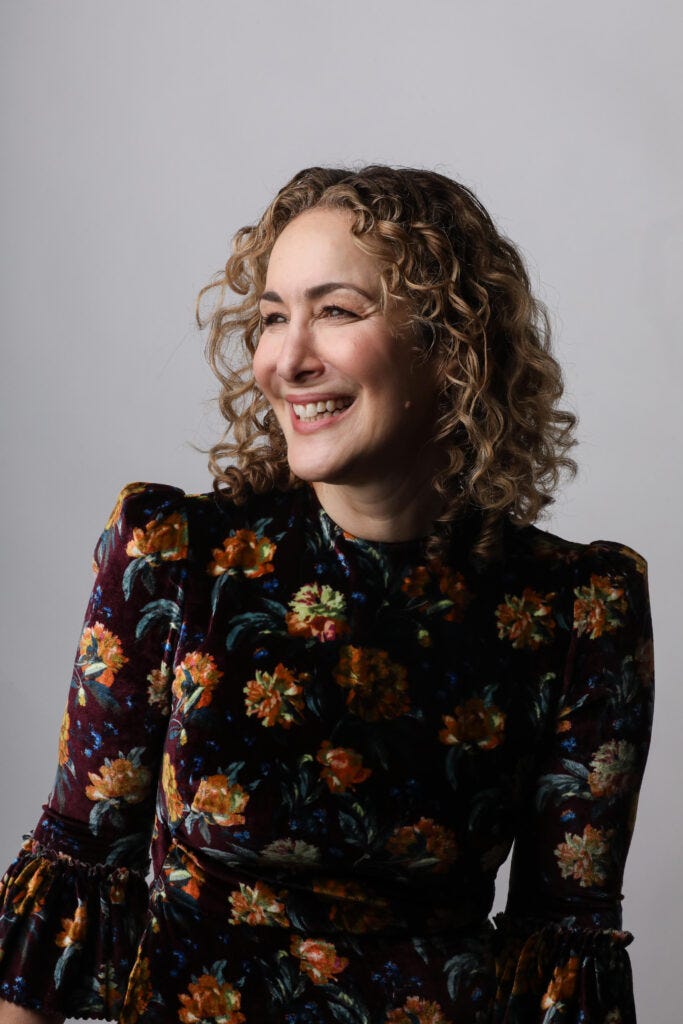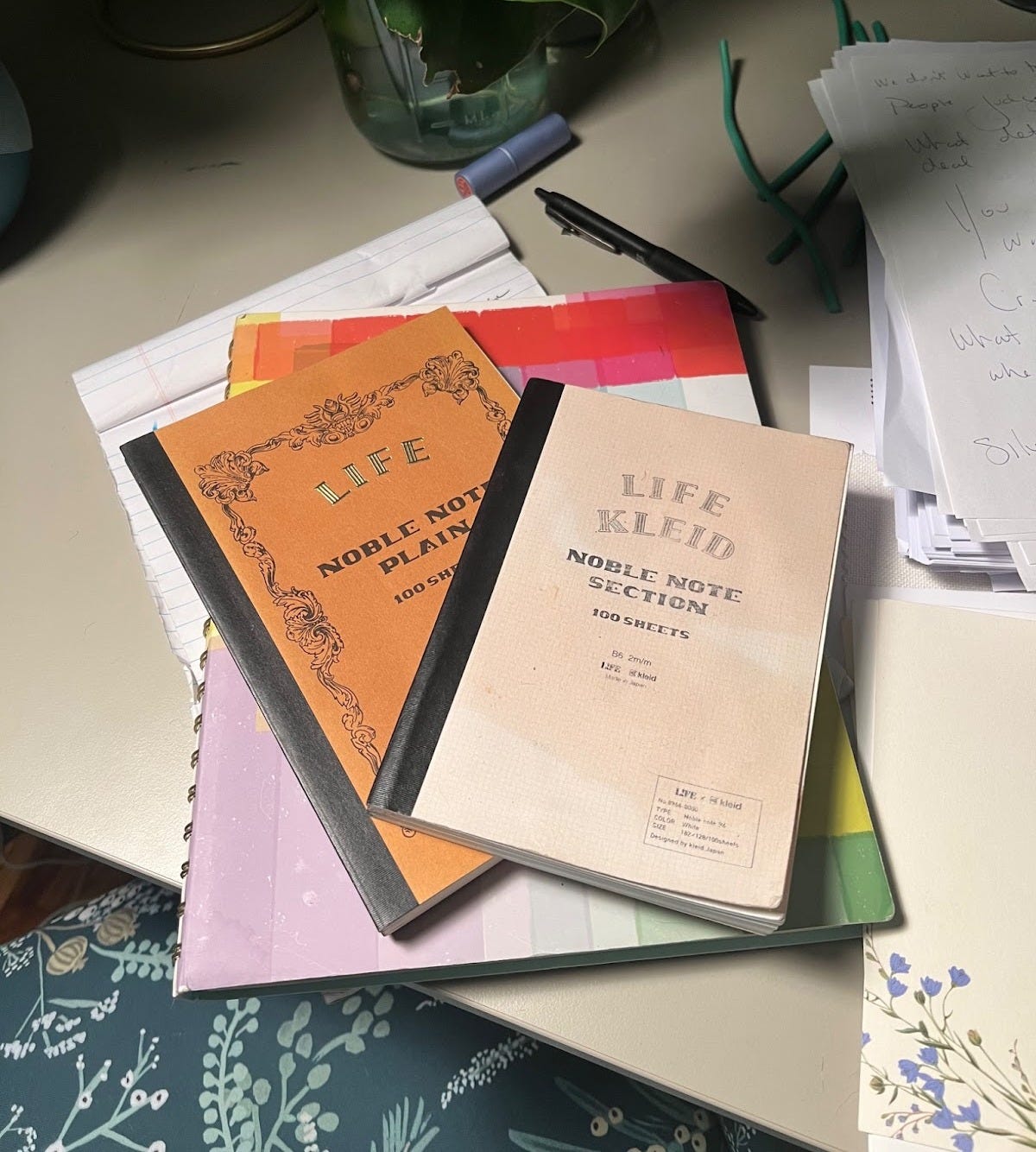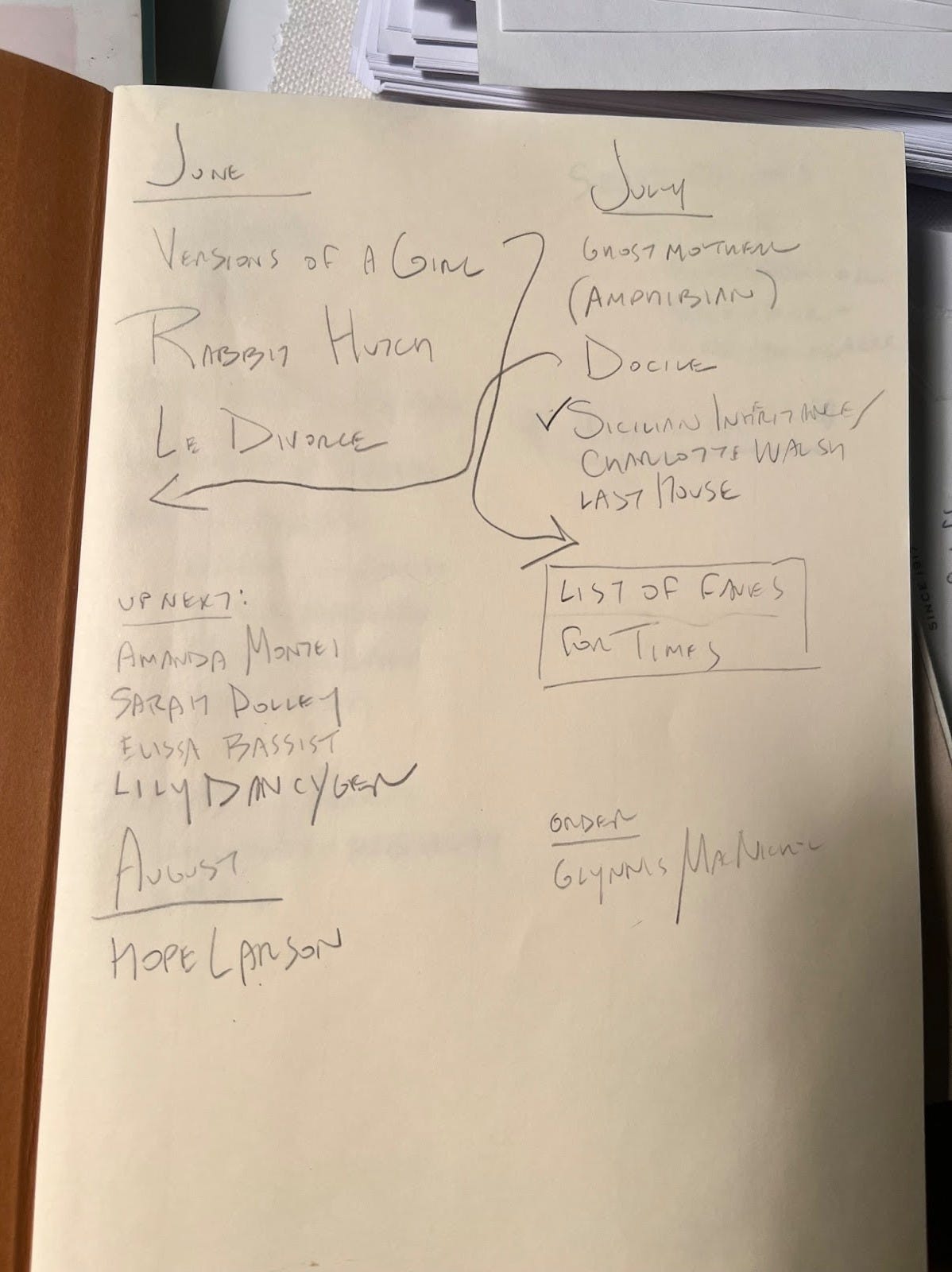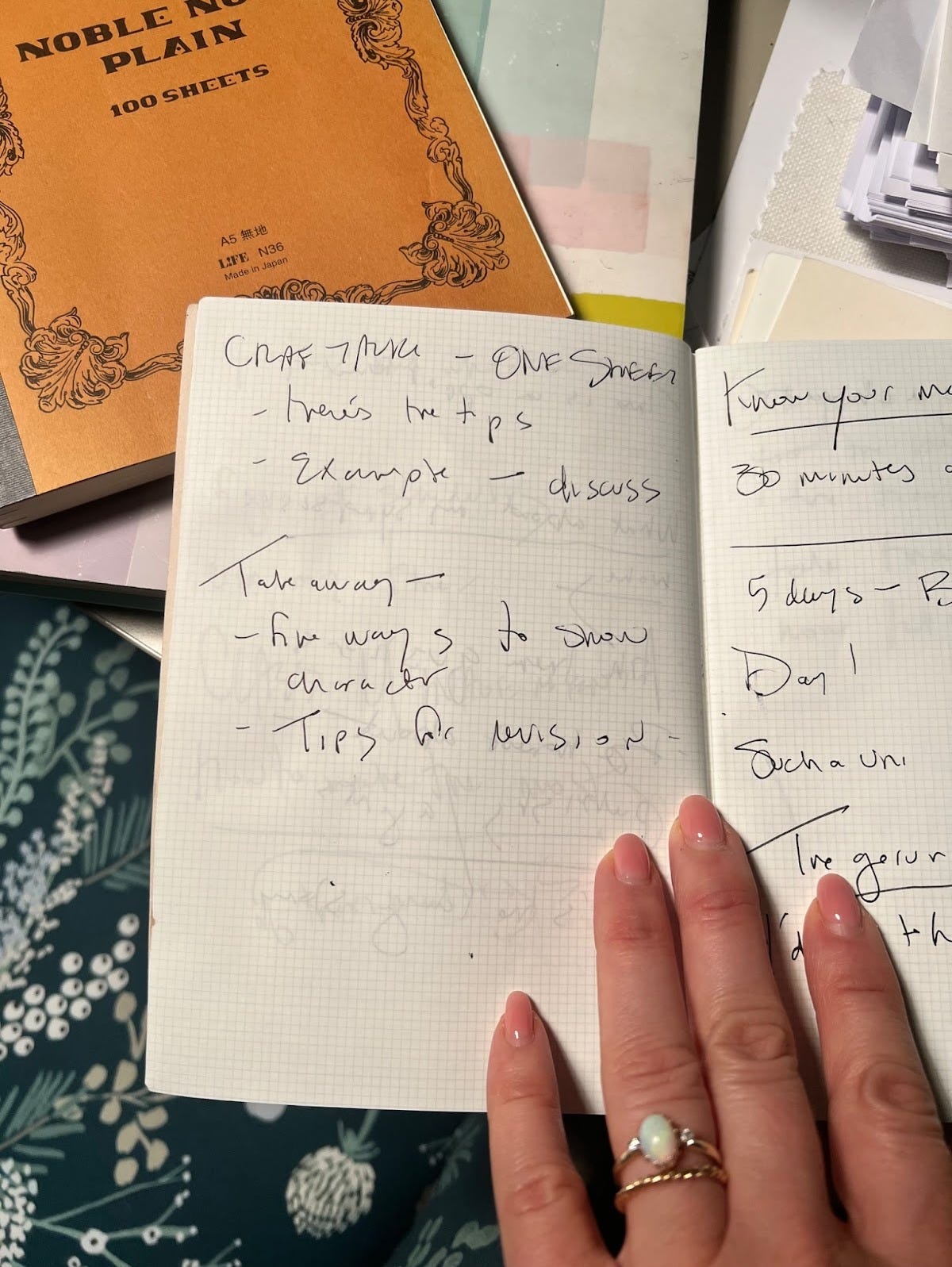Hello there! Welcome to The Magpie, a newsletter that serves as a collection of shiny objects about writing, creativity, hopes, and obsessions. My current obsession is diaries and the people who write them. Since I started keeping one at age eight, my diary has been a place of exploration and intensity, of lists and favorite quotes, of ticket stubs and wildflowers. It is a place to remember and a place to dream.
My most recent book, The Leaving Season: A Memoir in Essays, is out now! I relied on decades of my own diaries to help me write this book. My next book focuses on historical diaries of women, famous and not, and why we continue to write—and read!—these archives.
This is a Show Me Your Diary interview, a series that explores diaries and the creatives who keep them. Every week, I ask a new person to give us a peek inside their diary process, complete with photos. Yes, we are very nosy!
Want to show me your diary, or know somebody who does? Send me an email—you can just reply to this newsletter. Let’s get started…
Today’s interview is with Joanna Rakoff, a writer I’ve long adored from afar and met in person only a few short years ago, though it now feels like we’ve known each other at least one hundred. When I dreamed up this column, Joanna was one of the first writers who came to mind for an interview and, I trust, you’ll soon see why. She is the author of many books and essays, including the cult fave My Salinger Year (now also a movie!). Her forthcoming book, The Fifth Passenger, is built partially on caches of handwritten letters and diaries, and I knew, based on her part in our incredible AWP23 panel Motherlode: The Tripwire of Writing Real Family, that she had a lot to say about the role of a diary in a mother-writer’s life, specifically.
Reading over her responses brought back to me a line from Sylvia Plath’s diary: And by the way, everything in life is writable about if you have the outgoing guts to do it, and the imagination to improvise. The worst enemy to creativity is self-doubt. I love the way Joanna describes the way her daily diary writing (even when it doesn’t happen) impacts her creative life, as a place of experimentation, curiosity, and performance.
Below we talk about her favorite notebooks to write in (links provided!), the time her ex-husband made her throw out all her diaries, and how her diary practice changed as she traveled more, became a mother, and now looks on as her daughters start their own diary rituals.
And, of course, she lets us peek inside some of her actual diaries!
THE MAGPIE: Team Diary vs Team Journal? What do you like to call it?
JOANNA RAKOFF: For ages and ages, I called it a diary—through childhood, high school, college—and then, in my twenties, I realized that the term “diary” had babyish, uncool, unserious connotations. I vaguely remember someone, at a downtown party, saying something like, “a diary is just a record of your days; a journal is an exploration of them.” I, of course, wanted to be an explorer, not a recorder, so I switched over to Team Journal.
But: As I’ve grown older, and my life has become fuller and busier, I’ve come back around to Team Diary. Because I’ve realized that for me, the value of writing, by hand, in a book, every day—or however often I manage—lies less in recording or exploring and more in simply the act of writing purely for myself. And I’ve realized, too, that recording is highly important. It’s through recording that we gain the strength and knowledge to explore, to understand, to see the story. So, short answer: Team Diary.
Also, last week, at a party, a woman said to me, “I’m a journalist!” I was about to ask, “oh, are you freelance? What’s your beat?” But before I could, she said, “I’ve kept a journal for awhile!” And this made me feel that the term “diary” was now infinitely cooler than “journal.”
How long have you kept a diary?
Hmmmm, since I could write? I don’t remember, exactly, but I know that throughout my childhood, I had a succession of those padded little diaries with a lock and key, in which I wrote each night before bed, but never actually locked! Sometimes, I wrote poems and lists and life resolutions. Sometimes, embarrassingly, I recorded what I ate or exactly what I did throughout the day, but I always wrote in it.
What do you hope will happen to your journals once you are gone?
Is it weird that I’ve never thought about this? I loathe the idea of my kids or husband or anyone reading them—even reading my to-do lists!—but I also loathe the idea of this record of my life just…disappearing!
Because I’ve realized that for me, the value of writing, by hand, in a book, every day—or however often I manage—lies less in recording or exploring and more in simply the act of writing purely for myself.
What is your favorite kind of diary to use?
I used to be devoted to a larger format journal, ideally without lines or with large-ruled lines, but switched to smaller, lighter weight notebooks when I began traveling crazily, purely for ease. I still prefer a large, unlined sheet of paper—and think better with such a canvas—and sometimes wonder if I’d be a more regular and devoted diarist if I returned to that large format.
In general, I like a bound book that will lie flat when opened. I cannot use a spiral notebook or anything that will fall apart easily as it alarms me. I do love Papier products, and use their planners and notecards, but I’m not faithful to any one sort of notebook.
But: I also like to jot down journal entries in my planner (I love a planner that has a long “notes” section in the back and/or throughout; I really loved Papier’s Productivity Planner, which gives you a lot of space to jot down thoughts; I ignore the whole “plan out your project” element and just use it as a normal planner-slash-journal). And a year or so ago, when I was when I was laid flat by Long Covid—and really struggling to rest and otherwise take the necessary measures to get better—I bought this little thing called a Daily Mood Notebook, which has a two-page spread for each day. On one side, you check off whether or not you did the things a normal person does to function–sleep, drink water, move around–but which many of us (ME) don’t get to do in our crazed lives, and on the other, you have two small slots to list wins and annoyances, and then a blank space to write whatever you want. In theory, I loathe things like this—which have that Instagram Life Optimization vibe—but in practice, I love this little notebook, as it helps me focus on what I’m feeling, how I’m feeling—and why (e.g., I’m cranky and foggy because I got no sleep and spent the morning unclogging a toilet)—rather than, as I tend to do in my normal diary, narrating what happened and why, while ignoring the associated emotions. I highly recommend, even if it sounds cringey. You don’t have to tell anyone about it! I didn’t. Until now.
I’ll never tell! (ha!) How has your diary-keeping changed over the years?
I’ve become less precious, and less perfectionist—or rigid?—about this thing that is, ultimately, just for me, for my mind, my work, my sanity. I no longer feel I need to follow some set of inherited ideas about how or when or why to keep a diary. I know I might not write in it every day, or maintain a uniform length or format for each entry, and so I no longer force myself to try. Sometimes, I write in it every day, in prose, about what I did or read or what’s on my mind (so many despairing entries about too much housework and childcare and mental/emotional labor since 2020). Sometimes, I write lists, of things I’ve read, or things I’ve done, or things I need to do. Sometimes, I jot down disconnected thoughts or ideas for stories or essays or things I want to research or friends I miss. Sometimes, I write in it every night. Sometimes, not for weeks or months.
Also, and I’m almost afraid to admit this, I always have two or three—or, okay, more—physical diaries going at any given time. So I can just reach for one, whenever I am in the house, and write what I need to write, without wasting time searching for The Diary. I guess the point is: For me, now, keeping a diary is about writing, purely, rather than creating a document of my life or whatever.
Last week, my youngest child, who is eight, found one of my notebooks, handed it to me, and said, “you have so many notebooks!” And I explained the above–that I need to be able to write in them whenever and wherever, so I sprinkle them throughout the house–and she said, “that’s smart. You’re smart.” And I love, honestly, that she feels that way, that it makes sense to her, that she’s thinking about a journal, or diary, not as something to perfect–like a product–but as a tool that serves you, as a person, an artist, whatever.
For me, now, keeping a diary is about writing, purely, rather than creating a document of my life or whatever.
When do you write in your diary?
Usually, I write at night. I have whole days, sometimes weeks, in which I’m not writing—not working on my new book or an essay or review or whatnot—but purely playing my mother-and-housewife role, and on such days, writing in my diary helps me remember who I am, how I make sense of the world (writing), what I want to do, need to do. I’ve tried to write in my journal in the morning, but I find it difficult, perhaps because my brain is firing in so many directions, and I feel such a need to tend to productive tasks. But on days when I’m so overwhelmed I can’t get started on my actual work, I do turn to my diary as a kind of warm-up. (I also sometimes write letters or tasks like this—written interviews—as they ground me and get me thinking.)
Have there been periods in your life when you couldn’t write in your diary?
Yes, absolutely. This makes no sense but during periods of intense emotional turmoil—like the year after I left my first husband or the week my mother was in hospice—I found it impossible to write in my diary, though I tried, and occasionally succeeded. I have no explanation for this. Except that maybe I needed to work out these big, scary feelings in my head before I could write about them. But maybe I’d be a better person, and writer, if I could have written through cataclysmic moments?
What do you do with your diaries? Where do you store them?
They’re all in a generic plastic storage box in my basement, along with all my planners, but I do sometimes pull them out and read them! My older daughter, Pearl, also keeps a journal—hers are also filled, in part, with sketches—and she stores all hers (she has many! Despite being only sixteen!) on the bottom shelf of her bookcase. I once tried to put them in storage and she quietly, firmly told me “no,” that she wanted them out so she could revisit them. And I feel this might be a more healthy approach, as she’s okay with having all her past selves—no matter how naive, how embarrassing!—a few feet away from her bed, within arm’s reach.
Has anyone ever read your diary? Have you ever read someone else’s diary?
A million years ago—during the period chronicled in My Salinger Year—my then-boyfriend religiously kept a journal, in a huge black sketchbook, which he often left out, open on his desk. We lived in a tiny apartment and his desk was RIGHT THERE, and eventually, of course, I glanced at it, and discovered a whole entry about a woman who was very clearly not me (he talked about missing her “brown shoulders,” and I am notoriously pale). I felt, at the time, that he had perhaps wanted me to read his journal—why else would a person leave his journal open in the middle of a shared room?—and it changed my thinking about the nature of keeping a journal, and its positive and negative effects on a writers process and work. Because, you see, I think it’s possible to keep a journal performatively. To perform writing to yourself, for yourself. And I also think it’s possible to devote the energy to your journal that you should be reserving for your novel, your memoir, your work for publication, for an audience. That was, perhaps, the case with that long ago boyfriend, whose journal was more lively and interesting than the novel on which he was working, perhaps because he was actually writing it for an audience? (Me?)
Because, you see, I think it’s possible to keep a journal performatively. To perform writing to yourself, for yourself.
That experience, honestly, changed my relationship to my diary. I became conscious of why I was writing, if I was being honest, I began to consciously think of it as scaffolding for my real work (rather than becoming my real work!)! Perhaps this is when I became less precious about keeping a diary?
But one other short story: When I married the first time, at just 26, to someone I didn’t know well, I felt constantly afraid of him reading my diary. For when he read my work—at the time, poetry—he twisted my intentions and words in ways that alarmed me. And that fear made it hard for me to write in my journal—at all, ever. When I thought back on that old boyfriend leaving his journal out, open, all the time, I felt more sure than ever that he’d wanted me to read it. To create drama? To know him better? I don’t know. (My first husband, by the way, made me throw away all my old journals. I so, so regret allowing him to convince me that this was okay, and so wish I had them!)
(My first husband, by the way, made me throw away all my old journals. I so, so regret allowing him to convince me that this was okay, and so wish I had them!)
Is there a diarist you aspire to or a diarist who has inspired you?
Sylvia Plath. Hands down.
Have you read her diaries? They’re incredible. Pieces of literature unto themselves. I wrote my Masters thesis on Plath’s landscape poems (a very boring subject, btw, but in academia, the goal is to write on something undiscovered and, really, no one cared about those poems so…) and, thus, read her journals and letters many, many times. Now, tellingly, when a line or moment from her prose comes into my head, I often can’t recall if it’s from a letter or a journal, which is telling; meaning, her prose, in her journals, is as alive and exciting as that in her writing for an audience. This is very rare.
From Joanna Rakoff:
Perhaps you’d like to read my memoir, My Salinger Year or my novel, A Fortunate Age? The film adaptation of My Salinger Year is streaming on most platforms. If you’re interested in book recommendations and thoughts on reading, I write a monthly column for Jane Ratcliffe’s popular substack Beyond. My own substack, Books & Dresses, will be launching imminently (cross fingers!) and you can subscribe early to be entered in giveaways and other fun things. If you’re curious about my new book, The Fifth Passenger, which I’m finishing up right now, you can read excerpts, in essay form, in Kelly’s amazing anthology Wanting and Ann Hood’s new collection of essays on Gilmore Girls, as well as in Michele Filgate’s forthcoming What My Father and I Don’t Talk About (out May 6!).
Instagram: @joannarakoff
Threads, where I occasionally rant about pop culture:
If you're a Facebook person, you can follow my official author account for event info, videos of craft talks, etc., or my personal account, where I crowdsource hotel recommendations and medical diagnoses.UPCOMING EVENTS:
April 29, 7pm, Booked Reading Series, Fleur at the Omni Providence, with Nicole Graev Lipson, Amity Gaige, John Kenney, and Abigail ThomasMay 6, 7pm, Barnes & Noble Upper West Side, in conversation with Jessica Anya Blau about her delightful new novel Shopgirls
May 21, 6pm, Show Up Gallery, Boston, in conversation with multimedia visual artist Caron Tabb, about her solo show A Stone in my Shoe
June 4, 7pm, Brookline Booksmith, in conversation with Sarah Yahm, about her debut novel Unfinished Acts of Wild Creation (fun fact: this novel is set in my hometown and one of the characters is named after me!)
I'll also be teaching two classes virtually, something I almost never do, for the Boston writing center Grub Street:
May 27, 6:30-8pm, virtual, More Than Just the Book Cover: How to Be Your Authentic Self on Instagram
May 6, 13, 20, 28th, 10:30am-12:30pm, Finding (and Refining) Your Book-Length Story: Memoir and Nonfiction; a master class, breaking down the elements of great memoir, from finding the story (rather than the subject), to tone and style, to character building.
Thanks for reading The Magpie by Kelly McMasters! As always, more of what I’m up to can be found on my website, and you can follow me on Instagram for day-to-day updates.
Buy The Leaving Season here, Welcome to Shirley here, Wanting: Women Writing About Desire here, and This is the Place: Women Writing About Home here.














My aunt has been keeping a diary since the mid-1960s (!) and she’s talked about how she’s let everyone know that when she passes (she’s 91!), she wants them destroyed (unread). I love this.
This was delightful! There is nothing I love more than seeing and hearing how others write and use notebooks. Also, I bought My Salinger Year last week and started reading it last night- what a joy !! And, this dress in the picture is STUNNING! Very Vampire's Wife esq.